 I love logic puzzles, especially ones that use a deduction grid (matrix?). In fact, almost a decade ago I bought a logic puzzle book on my honeymoon in the Caribbean. I’ve brought that little book to every beach vacation since then and it’s definitely showing some wear. But there is nothing like sitting on the beach in the sun and working on those little puzzles (SAT questions as my friend calls them). For me, I love the sense of discovery when I figure one out.
I love logic puzzles, especially ones that use a deduction grid (matrix?). In fact, almost a decade ago I bought a logic puzzle book on my honeymoon in the Caribbean. I’ve brought that little book to every beach vacation since then and it’s definitely showing some wear. But there is nothing like sitting on the beach in the sun and working on those little puzzles (SAT questions as my friend calls them). For me, I love the sense of discovery when I figure one out.
So when I first heard about Alchemists, a deduction game published by Czech Games Edition (CGE), I had a feeling that this game would definitely be in my wheel house. Alchemists is a game where players are trying to deduce the identity of 8 different ingredients while trying to also become the most famous potion maker in the land. One of the most noteworthy things about Alchemists is the use of an integrated smart phone app. Is this integration a gimmick or the real deal? That’s a question that needs to be answered, so let’s find out.
Alchemists is a worker placement and deduction game for 2-4 players that takes about 2 hours to play. Alchemists plays great with any number of players.
Game Overview:
In Alchemists, players take on the role of rival potion makers trying to become the most prestigious (and rich). The game is played out over 6 rounds in which players will be mixing ingredients, selling potions, buying artifacts and publishing theories.
The main goal the game is to figure out the identity of the alchemical symbol for each of the games 8 ingredients. If you can correctly deduce those (and be quick about it), you’ll earn valuable reputation, the games form of victory points. Earn the most reputation by the end of the game and you’ll be the winner.
Game Components:

Alchemists is published by veteran game publisher CGE and they are no strangers to putting out games with high quality components (T’zoklin, Dungeon Lords). Inside this rather heavy box is a mountain of cardboard. From the expansive game board (with some really stellar artwork) to the 4 different player screens (some assembly required), everything that comes in the box is both high quality and thematic.
I should note that there have been reports of issues with the player screens in the first edition of the game (the holes were a bit too small), but I didn’t encounter this with my copy of the game. CGE has also volunteered to replace any game parts of the game that aren’t up to their high standards.
The game also uses a smart phone app (free to download for iOS and Android). The app is well designed, bug free, and works amazingly well for the game. I will note that using the app is not required (more on that later), but I would say it’s highly encouraged.
How to Play:
I’m not going to go into every detail of how to play Alchemists. Suffice to say, it’s a fairly complex game and you can download the full rulebook here, or watch this game play teaching video if you want more information.
Alchemists has two main mechanics (worker placement and deduction) and I’m going to talk about each of them in turn.
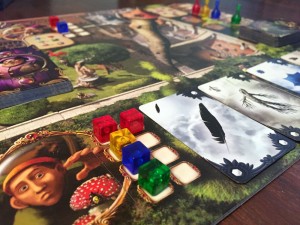
Worker placement:
Alchemists takes place over 6 rounds with each round (except the last) following this structure:
- Turn order – Each player, starting with the first player, chooses their wakeup time. The later you wakeup, the more benefit you gain (favor or ingredient cards), however you will take your actions later in the round.
- Declare Actions – Starting with the player who goes LAST in the round (and up the track from there), place your action cubes on worker spaces in your assigned rows.
- Resolve Actions – Actions are resolved one area at time (in turn order). Player cubes are resolved top to bottom, left to right.
- Cleanup – Cards are refreshed, reputation awarded or penalized, and the first player token is passed.
Different actions that a player can do:
- Harvest Ingredients: Gain ingredients to use in potion making
- Sell ingredients: Sell an ingredient for 1 gold piece.
- Sell a potion to an adventurer: This is the only space that not everyone can do. Players will bid to sell a potion to the current adventurer. You gain gold depending on how close you get to the potion the adventurer was wanting.
- Buy an Artifact: Artifacts are powerful items that help you break the rules and earn you reputation points.
- Publish a Theory: If you think you know which alchemical belongs to one of the ingredients (or even have a good guess), you can publish a public theory. This will earn you reputation points.
- Debunk a Theory: If you think one player is wrong in their published theory, you can disprove them. Disproving them earns you reputation and possibly penalizes them.
- Test a Potion on a Student or on Yourself: Choose two ingredients and scan them with the app. It will tell you what type of option you just made. It will either be one of 6 different potions… or just water. However, 3 of the potions are harmful and there will be consequences for drinking those.
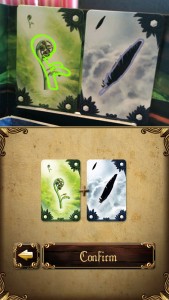
Deduction:
Each potion you make will be one of 3 colors, and have either a “+” or ”-“ symbol. Using the game’s logic, you can begin to eliminate specific alchemicals after you make a potion. Every alchemical has a green, red and blue circle on it, each of which has a “+” or ”-“ symbol.
The main logic is it takes a big circle and a little circle of a matching color and symbol to make a potion. So if you make a Red “+” potion (healing), then you know the 2 ingredients you used must have a red circle with a “+” sign in their alchemical. So you can safely eliminate every alchemical with a negative red circle. It’s through this process that you begin to figure out which ingredient goes with which alchemical.
That’s a high level overview of the game. Players earn reputation points for being the first to publish theories, being correct in their theories, from artifact cards, from left over money and from conferences during the game. The player with the most reputation at the end wins.
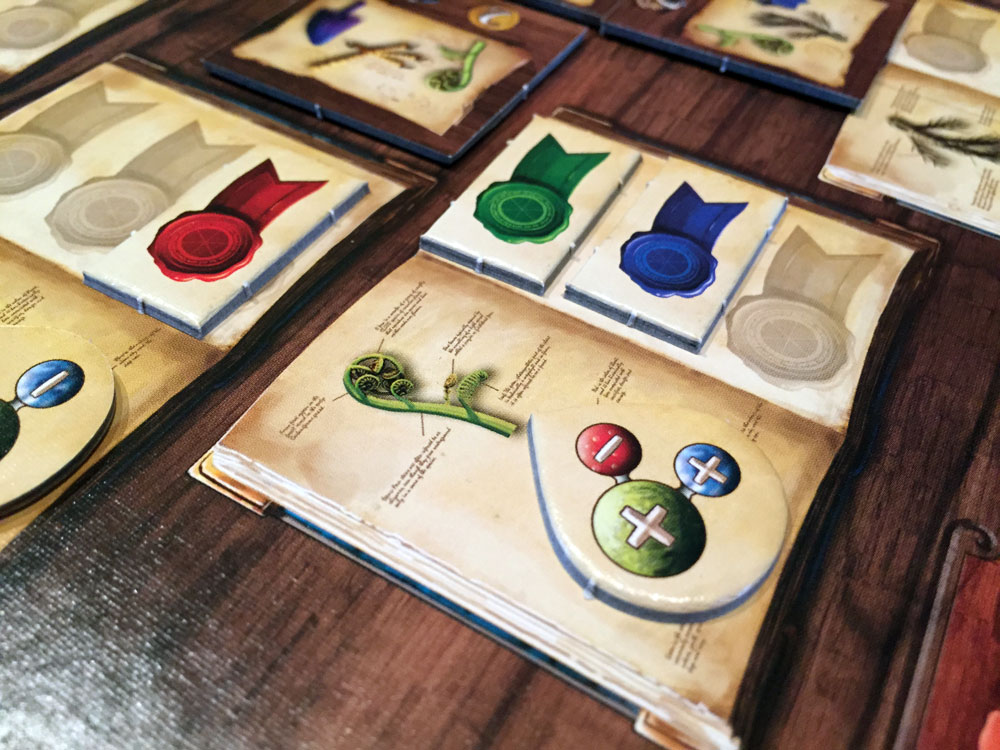
Game Experience:
In case you can’t tell from the above explanation, Alchemists is a heavy game. Even with only two players, you are looking at least 90+ minutes. Probably more than that for a learning game. If you are the type of person that likes quick playing games, then this is not the game for you.
However, I can say that those 90-120 minutes go by fast. There is always a lot to do in Alchemists, especially at the higher player counts when your actions are more limited. While there is some downtime in Alchemists, it’s offset by the fact that you will always be staring at your deduction grid trying to figure things out. This makes the game feel like it’s moving along even when it’s not your turn.
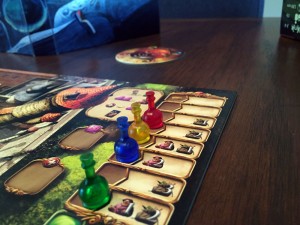
Speaking of actions, I will say that they game is much tighter at the higher player counts. With only 2 players, you get 6 actions cubes to use, however you only get 4 cubes at the top of the range. While that might not seem like much, those two actions can make a big difference. Competition will be a lot more fierce with 4 players to be the first to publish.
Alchemists is technically a worker placement game, but I’d say that the worker placement element is fairly light. There is really no action denial in Alchemists. For the most part, if you want an action, you can take it (other than selling potions). There is still a benefit for going first though, be it card selection or trying to publish first.
However, the clever turn order track and the way the cubes were placed was a stroke of brilliance in my opinion. Players who go later in the round, place their cubes first. This allows the players going first to see what their opponents are doing before placing their cubes. So if you know 2 of your opponents are going to try to sell a potion that round, you can opt to go somewhere else and avoid the bidding war. I love this mechanic and hope to see it incorporated into other worker placement games.
So while we are on fresh concepts, lets talk about the app. The integration with the app in Alchemists is fantastic and really makes the game better than it would be without. The app integration is no a gimmick. The game randomizes based on the reader, this allows for a lot of variation in the game, enhancing its replay value. I’m sure there are board game purists out there that are 100% against using smart phone apps in games. For you guys, CGE has incorporated game master mode.
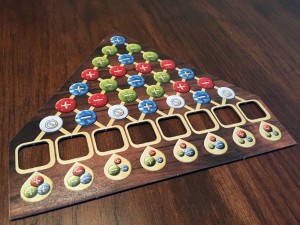
What I like to call “the worst job in board gaming”, one player takes a cardboard grid at the start of the games and assigns each ingredient an alchemical. Instead of using the app, one player asks the game master what his pairing produces. The game master tells him and the player records it in his notes. And that’s it for the game master… for 2 hours. If really don’t want to use the app and prefer to go with the game master, I’d suggest inviting someone you hate over, because this role seems pretty horrible. Seriously though, if you hate the app integration that much, I’d suggest playing something else.
If Alchemists had a flaw it would be that luck can play a decent role in the game. I’ve found that when mixing potions, if you get some undesirable results early (water or duplicates), this can set you back a little. In some games, I’ve been lucky enough to deduce an alchemical with certainty on round 2, other times, not even close. The artifact cards can also be fairly powerful (only 9 are available in the whole game) and buying the right one can make a really big difference in your game. Something to be aware of.
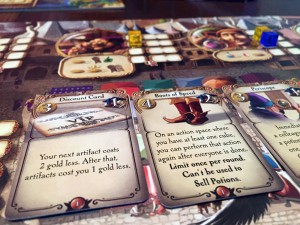
Finally, I want to touch on the learning curve. After my first game of Alchemists, I wasn’t the biggest fan. The game seemed overly complex and I wasn’t sure about it. After a few more plays though, I ended up loving it. I think this is really a game where you need a full game just to wrap your head around everything. I’ve found most people have issues understanding how the alchemicals work. Even with the rules, guides and videos, it still is a bit of a challenge to get down. Once that all clicks though, Alchemists really shines as a solid and well designed game.
Final Thoughts:
I’m already running a bit long, but suffice to say, I am enjoying Alchemists more with each play. The game is quickly moving its way up on the list of worker placement games I always want to play. The play time does make it harder to get this one to the table and I almost wish they’d come out with an express version because I love the deduction and the fantastic card reader.
However, wrapped up in all this complexity and components is a really “thinky” board game that’s quite unique to the other games out there. If you are like me and you love logic puzzles and lateral thinking, then I could see Alchemists easily finding a home in your gaming collection. Alchemists isn’t a game I’m going to be pulling out all the time (I’d recommend not being sleepy when you do), but when I have the time and the right group of people, it can make for a great choice. Check it out today.
If you’d like to get a copy of Alchemists, you can pick it up today for $40.
Final Score: 4 Stars – An innovative and engaging euro game that uses technology in a way that improves the game so much that I wouldn’t want to play it without.
 Hits:
Hits:
• Innovative game play
• Great integration of an iOS app
• Well designed components and app
• High replay value
Misses:
• Heavy game with a steep learning curve.
• Luck can play a bit of a factor in how well you do







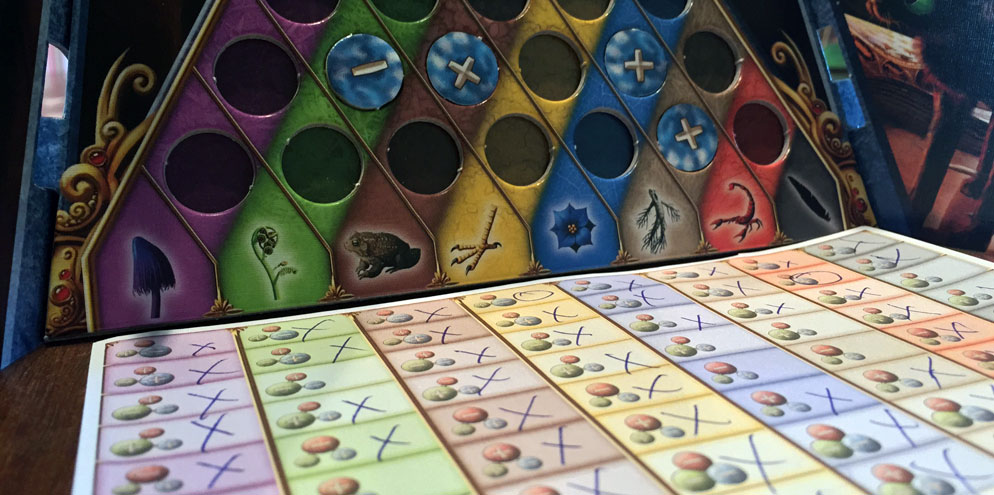















As soon as I read the point about needing 90 minutes for the game, I tuned out. I tend to play games that are engaging in the first 5 minutes and then write about them on my site.
Fair enough. Games aren’t always for everyone. 90 minutes is a fine length for my tastes.
Great review for a great game. The game length for two can be lower than stated once you know the rules, but I am very happy for this game to run long as it is fun!! 10/10